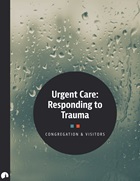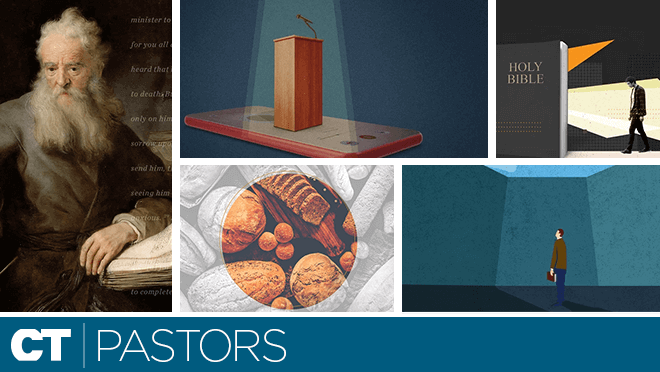A significant person in my extended family has just died. Even though our relationship was always a complicated one—different temperaments, different views about the conduct of faith, different perspectives on … well, almost everything—I feel stricken. In my deepest parts there are regrets and appreciations. And many stories.
For me, this death has generated that bundle of sensations called grief. I've often defined grieving as our behavior when we try to deal with something we were not created to experience. The Creator simply didn't wire us to die. Nevertheless, we must deal with this inexorable event: the dying of others and, eventually, our own death.
Because this end-of-life experience is incomprehensible, it can generate fear, loneliness, disorientation, loss, and mystery. We become paralyzed in swirling feelings that seem incapable of any helpful summation.
When you've been a pastor as long as I have, you've seen varieties of grief close up when people have invite you into their private lives in that poignant moment. You think you've learned the right ways and the wrong ways to grieve. I've seen hysterical grief, which seemed over the top, and I've seen hollow grief, which caused me to wonder if the griever had any feelings at all about the departed.
What I've learned—a no-brainer, actually—is that everyone grieves in different ways, for different periods of time, and for different reasons. Along the way there can be tears, anger, withdrawal, conversion, regret, and pleasant recollection.
I once asked an Episcopal priest if he could ever remember a speechless moment in his ministry-life. Yes, he could, he said. It occurred in a funeral parlor where an old man (married 57 years) stood by the casket of his wife. The priest—then very young—approached and quietly said, "Fifty-seven years is a long time." And the widower, without hesitating, responded, "Too d—long; she was meaner than h—." Have a name for that kind of grief?
But then there's this. I once sat with two brothers in the living room of their home, their suddenly-stricken father lying dead on the living room couch awaiting the funeral director's coming to take the body. "Our grief is strong and sweet," one of the brothers said. "We told our father how much we loved him, that we were thankful for all he'd done for us. He knew Jesus and he was confident that we also followed Jesus. So we can let him go. There is nothing of importance that has been left unsaid."
Back to me. When I learned of this family member's death (it was anticipated), I made a conscious decision to let my heart have its way. I chose to feel this loss and not be ashamed or secretive about what was happening within me. Perhaps this may seem strange that I would have to do this, but I grew up in a spiritual tradition which, all-too-often, told people what was a correct form of grief and what was incorrect. Even in death, there was a "prescriptive way" to feel and act.
In my child-years, it was fashionable for some to say of a funeral, "Oh, 'twas a blessed event. There wasn't a tear in the church. All we did was celebrate." If that's what some want, I'm inclined to say, "have it your way." But I'm impressed that even Jesus wept at the death of his friend Lazarus.
In these last few days I let my inner person quietly wail, and I have discovered these things.
My grief has aroused and rearranged both good and not so good memories of this person. I have chosen to preserve the good memories and express gratitude for them, and I have chosen to bathe the bad memories in grace and renounce any hold they have had on me. The objective: to get the recollections settled and filed away in my soul so that I shall fully love this person into eternity. Naturally, this effort will take some extended time.
My grief has taken me back to the Scriptures where I have reminded myself of its teaching on heaven. I have found myself asking interesting questions about this relative now in heaven: some humorous, some searching. How did he arrive at heaven (taxi, train, horse and carriage)? Is there an orientation program (like your first day at college, your first hours at camp?). Does he feel instantly acclimated to heavenly life? And what happens when he runs into people in heaven who were lifetime adversaries here on earth? What will he say to his (divorced) first spouse? His parents (who may have some explaining to do). What about the people he was sure would never get to heaven (mostly Democrats)? What will he say to them? Does he get a personal interview with Jesus? Will he find that heaven is just a perpetual worship service as some seem to believe? Or will there be creative work to do? I hope for the latter.
My wife, Gail, and I (like most married couples) occasionally joke—or not joke(?)—about which of us will die first. And I often tell her, "If you go before me, I can imagine arriving in heaven later on and discovering that you've got a gazillion coffee-dates with Brother Lawrence, Mary Slessor, Catherine Booth, and Amy Carmichael (some of her heroes). You're going to be so busy that you won't have time for me until ten thousand years have gone by." Gail usually laughs at me and reassures me that this couldn't happen.
My grief has taken me back to the biographical section of my library to remind me of how other heroes of faith died and how they viewed their final days. I am less impressed with some of the Victorian Christians who scripted their last dramatic words far in advance of their death-bed moments (as in "one small step for man …"). Some called these elegant 19th-century soliloquies "the happy death." There are the English martyrs who said to the executioner, "Bring it on." And there is lovely and strange St. Francis dying, naked, on a dirt floor of a shack in the woods because he wished to die a pauper and out of the sight of institutional religion, which he despised so much. The man died as he lived.
Today most of us die less dramatically: in a hospital bed, entubated, surrounded not by the sounds of singing angels but by the beeps and buzzers of medical technology. Can we do better than this?
My grief has awakened a need to be with friends and close family members. To sit and talk with them without agenda. Why? I am not sure. Actually, I am an introvert by temperament and usually wish to be alone in my melancholy moments. But in the wake of this loss, I yearn for the company of the intimate people in my life. I want to tell them stories about this person and hear myself describe to them how I feel. I appreciate their embraces, their reassurance that they are present to me.
Finally, this grief has reminded me of my own mortality. A few days before my relative's death, I stood at his bedside and took in the sight of his cancer-ravaged body and heard faltering, sedated words lurch from his once-sharp mind. I watched his wife tenderly spoon-feed him his last morsels of nutrition. In it all I saw a vision of myself in a not-too-distant day. And I concluded, "We travel from the beauty of infancy to the strength of maturity and on, inexorably, to the grotesqueness of the dying days. And we make the journey so quickly. Few of us are ever ready for the last stop."
In these moments, the lines of Scripture that have meant the most have been ones I've read in many funerals. On those occasions I read the lines for other grievers. Today I read them for myself: "(In the new heaven and new earth) He will wipe away every tear from their eyes. There will be no more death or mourning or crying or pain, for the old order of things has passed away."
No more death. No more mourning. No more crying. The old order of things: passed away.
Apparently, there is no grief in heaven.
Gordon MacDonald is editor-at-large of Leadership Journal and chancellor of Denver Seminary. He lives in New Hampshire.
Copyright © 2011 by the author or Christianity Today/Leadership Journal.
Click here for reprint information on Leadership Journal.

Support Our Work
Subscribe to CT for less than $4.25/month


























